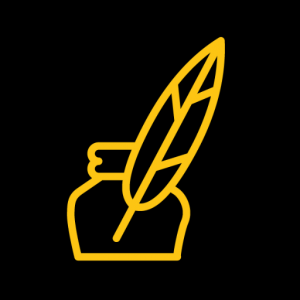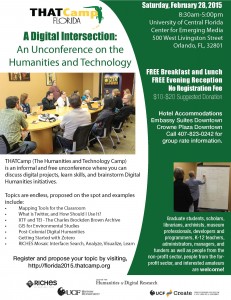I posted my record of select sessions on FSU’s Digital Scholars WordPress blog. Here is the link: THAT camp Florida 2015
Inclusion through Digital Media
If a slot is still available for the afternoon session, I’d like to propose a session on how public projects can be a forum for capturing and highlighting the texture of cultural experiences. Video documentation works well online for documenting new immigrant groups with strong oral traditions. Narrated personal experience or choral performance can provide compelling ways to make global events more comprehensible.
Does the technology we use also tell its own story? In what ways do paper and video or onsite research and online access change the story told — and the story heard? How do we ensure that our projects operate in a way authentic to those who are telling their story, rather than just what is convenient to our institutions?
I can provide examples from my work with immigrant communities and archives (particularly Sheeko, with Somali youth: blog.lib.umn.edu/ihrc/sheeko/; Digitizing Immigrant Letters (European: www.ihrc.umn.edu/research/dil/Paikens/paikens.htm); and a choral performance of ethnic music: vimeo.com/76913574.
Others interested in this conversation?
Poetry in 256 characters: PPG256-1
In his book !# (pronounced “shebang”), Nick Montfort exhibits several short programs and the output of those programs. One program, PPG256-1 (Perl Poetry Generator 256, number 1) produces poetry from a dense Perl program of 256 characters.
In this session, we’ll look at PPG256-1 and how it does its magic, and perhaps talk about programming as both text and the creator of text.
PPG256-1:
sub b{@_=unpack"(A2)*",pop;$_[rand@_]}sub w{" ".b(cococacamamadebapanohamolaburatamihopodito).b(estsnslldsckregspsstedbsnelengkemsattewsntarshnknd)}{$_="\n\nthe".w."\n";$_=w." ".b(attoonnoof).w."\n" if $l;s/[au][ae]/a/;print;$l=0if$l++>rand 9;sleep 1;redo}
D.I.Y. Tools for Mapping/Visualizing Spatial History
This workshop is designed for anyone interested in finding/sharing a do-it-yourself tool or platform that can be used to map the movement of people, culture, ideas, etc., across place and time. The presenters will include 11 University of Central Florida graduate students working with the Florida State Parks on the “Wish You Were Here” project, which focuses on six historic state parks that originated as private resorts/attractions in the roadside/auto-tourism era. A series of lightning-round presentations will address the following tools/platforms from the perspective (in most cases) of first-time or novice users:
- StoryMapJS (Callie Henson, Carly VanZandt)
- MapStory (Drew Fulcher)
- Google Earth (Marcus Berzon)
- Google Maps (Jim Poppino)
- RICHES MI (Mark Barnes)
- HistoryPin (Sarah Thorncroft, Porsha Dossie)
- QMedia/YouTube (David Morton)
- TripLine (Rebecca Schwandt)
- HistoryInMotion (Fernando Maldonado)
- MapScholar (BobClarke)
- Neatline (Bob Clarke)
Please join us and share your thoughts on finding the right mapping tool for your project.
Organizing GIS in Central Florida
Geographic Information Systems/Science gives users a way to think spatially and solve many kinds of problems. GIS is used in many different fields, in the private and public sector, in universities, government agencies and non-profits. Please join us in this session as we make connections within the Central Florida GIS community, and talk about what comes next. Participants include Al Hill, GIS manager for Volusia County, and John Walker, anthropologist from UCF.
Annotate the World Using Genius
Genius.com was formerly the music wiki RapGenius, but it’s now open to a series of genres, including literature, film, history, and law. Genius’s tagline is “annotate the world” — anyone can annotate any line of text (and, soon, any kind of image), using not only words but also images, videos, and music. Users can create pages of text that can be tagged and linked to other texts and related issues. Genius admins can construct “tag pages” and postlets that essentially work like multimodal, interactive, editable syllabi. I’ve been hacking it to have my students make DIY Anthologies.
I propose a session where we gather together and play with the concept of “annotating the world” using Genius. We’ll call this a teach/play session, since I’ll be ready to familiarize people with Genius and to show them how to make DIY Anthologies (if there’s interest), but I’m also interested in learning about other possibilities for the site.
Here are a few ideas we might explore further:
- Annotating the rhetoric of city spaces — like memorials in Ferguson — and landmarks
- Using Genius to create interactive, multimodal timelines
- Annotating artwork (when the feature becomes available)
- Crowdsourcing digital syllabi
- Transnational (or at least cross-country!) classrooms — where students in multiple states read the same texts and then annotate collectively
- Using Genius to foster undergraduate research (and ethical citation practices)
No coding is required to use Genius.
Annotate the world!
Charles Brockden Brown Electronic Archive and Scholarly Edition–and “building” digital archives
Our session proposes to talk about current updates to the Charles Brockden Brown Electronic Archive and Scholarly Edition platform (XTF) and user interface, including refinements in our primary and secondary bibliography metadata. Questions are invited about our choice of platform, archive selection process, use of TEI, use of Library of Congress Subject Headings, and other processes relative archive interface design and usability.
In 2014, we published “The Charles Brockden Brown Archive: Mapping Archival Access and Metadata” in Archive Journal.
We look forward to discussing digital archives and editions that are in progress–or being planned!
Podcasts: From Classroom to Publics
Graduate students in the Department of History at the University of Central Florida have produced a local community based research podcast call A History of Central Florida. This video podcast is a 9,000 year chronological history of central Florida through the objects found in local area museums, historical societies and other public collections. The impetus for this project was to bring attention to the museums and their artifacts in the hope that people would view the podcast and take interest not only in the entire series but also the museums themselves. The tag line of the project is “The Museum on the GO….GO to the Museum.” Ideally we want people to see the podcast and museum on their mobile devices and then that would inspire them to travel to the museum themselves to see the artifact in person.
This panel will discuss the process of going from the classroom to the greater public and creating a video podcast with a community outreach purpose. We will show samples from the series and students and professors engaged in the project will lead a discussion on this project.
People involved attending THATCamp:
Robert Cassanello, Associate Professor of History, UCF
Daniel Murphree, Associate Professor of History, UCF
Katie Kelley, Graduate Student, UCF
Bob Clarke, Former Graduate Student, now adjunct faculty UCF
A link to the series on iTunes is here.
UF Digital Humanities Library Group’s Developing Librarian Project
Several folks from the UF Digital Humanities Library Group’s Developing Librarian Project Team will be attending THATCamp-Florida. This is a proposal for a talk session where representatives from the group provide updates on the project to date, activities, and plans for the future.
As we explain on the group blog, the University of Florida Developing Librarian Project is a pilot collaborative re-skilling program for librarians interested in supporting campus Digital Humanities activities and staffing the Scott Nygren Scholars Studio in Library West.
Our charter explicitly details our scope, deliverables, outcomes, etc. We modeled our project after Columbia University Libraries’ Breaking the Code project. Our year-long program is funded by an internal Smathers Libraries mini grant, proposed in May 2014. Training has focused on building project management and digital project skills, as well as hands-on practice with enhancing intellectual access to the Baldwin Library’s digitized Grimm Brothers sub-collection through a project titled Mining the Brothers Grimm: Curating a digital subcollection.
Work with the 19 previously digitized Grimm collection items offers participants practical experience working with Digital Humanities software (for digital curation, text markup, text and data mining, visualization, linked data, and online exhibits). This project blog chronicles and shares our planning, training, practical work, and experiences during the pilot phase of our project and may continue to highlight group activities beyond the grant period. We’ll use this site as a convenient location for internal business and information sharing and point interested users to the products of our work as they become available. Once the grant period ends this site may change, so don’t expect preservation of its full contents.
Working groups and participants:
- Digital Humanities Library Group (DHLG)
- Developing Librarian Project members per mini grant proposal
- Landor, Blake (PI)
- Taylor, Laurie (Co-PI)
- Alteri, Suzan
- Arlen, Shelley
- Asher, Alan
- Clapp, Missy
- Cusick, Jim
- Freeman, Richard
- Harms, Sarah (Student assistant)
- Jefferson, Rebecca
- Langford, Gerald
- McAuliffe, Carol
- McBride, Peggy
- Reboussin, Dan
- Roberts, Judith
- Saltzburg, Richard
- Van Hook, John
- Working Groups
- Text Enhancement Initiative (TEI)
- Alteri, Suzan
- Arlen, Shelley
- Freeman, Richard
- Landor, Blake
- Langford, Gerald
- Van Hook, John
- Blog
- Freeman, Richard
- Harms, Sarah
- Reboussin, Dan
- Exhibit
- Arlen, Shelley
- Fitzsimmons, Rebecca
- Jefferson, Rebecca
- McAuliffe, Carol
- McBride, Peggy
- Studio & Events
- Alteri, Suzan
- Clapp, Missy
- Harms, Sarah
- McBride, Peggy
- Taylor, Laurie
- Text Enhancement Initiative (TEI)
- Developing Librarian Project members per mini grant proposal
More information on the UF Developing Librarian Project is available on the group blog: ufdevelopinglibrarian.wordpress.com/ as well as in the meeting and internal grant materials: ufdc.ufl.edu/l/results/?t=dhlg
Got an idea for a THATCamp session?
THATCamp works best when registrants propose ideas for sessions prior to the day of the meet-up. That helps generate interest and excitement around particular topics, and facilitates the scheduling of concurrent sessions throughout the day.
This year’s event is scheduled for Saturday, Feb. 28, which is just a couple of weeks away. If you haven’t done so already, please register now and propose a session here.





